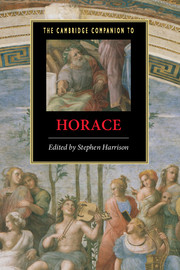Book contents
- Frontmatter
- Introduction
- Part 1: Orientations
- Part 2: Poetic Genres
- Part 3: Poetic Themes
- 12 Philosophy and ethics
- 13 Gods and religion
- 14 Friendship, patronage and Horatian sociopoetics
- 15 Wine and the symposium
- 16 Erotics and gender
- 17 Town and country
- 18 Poetics and literary criticism
- 19 Style and poetic texture
- Part 4: Receptions
- Dateline of works and major political events
- Works cited
- Index
12 - Philosophy and ethics
from Part 3: - Poetic Themes
Published online by Cambridge University Press: 28 May 2007
- Frontmatter
- Introduction
- Part 1: Orientations
- Part 2: Poetic Genres
- Part 3: Poetic Themes
- 12 Philosophy and ethics
- 13 Gods and religion
- 14 Friendship, patronage and Horatian sociopoetics
- 15 Wine and the symposium
- 16 Erotics and gender
- 17 Town and country
- 18 Poetics and literary criticism
- 19 Style and poetic texture
- Part 4: Receptions
- Dateline of works and major political events
- Works cited
- Index
Summary
In his later poetry, Horace himself spins a narrative about these controversial topics. Poetry can be 'useful', 'delightful', or both (Ars Poetica 333-4). It has 'useful' ethical functions (Epistles 2.1.126-31). Writing 'well' (technically and morally) requires 'wisdom' sourced from Socratic and Platonic philosophy (Ars Poetica 309-22): Socratic writings provide the poet’s basic material; life is like a drama, but different social roles have appropriately different 'duties', 'parts' and 'characters'. Here the poetic representation combines the 'is' and the 'ought', and traditional Peripatetic literary theory is overwritten by the moral relativism of the Stoic philosopher Panaetius (who greatly influenced late Republican Roman philosophy). 'Philosophy', both in its broadest sense and in the narrow sense of specific philosophies, informs Horace’s own poetry.
Epistles 2.2.57-60 itemises Horace’s range:
What do you want me to do?
Moreover, not all men admire and love the same things.
You rejoice in lyric, this one delights in iambics,
That one in Bionian 'conversations' and their black salt.
The Satires
Horace has written ‘lyric’, ‘iambics’ and ‘conversations’ (= ‘satires’). Why the emphasis on Bion, the largely Cynic (‘doggish’) philosopher?
The Satires parade numerous satiric predecessors, models and exemplars without naming Bion, but Horace here advertises his reading of Bion: ‘black salt’ refers both to the salt fish sold by Bion’s father and to Bion’s ‘abrasive’ wit. ‘Conversations’ glosses ‘diatribes’, or ‘informal philosophical talks’, a form associated with Bion The Roman satirist Lucilius ‘rubbed the city down with much salt’ (Satires 1.10.4) and was ‘of wiped [keen] nose’ (1.4.8), just as Bion’s father ‘wiped his nose with his elbow’ Lucilius is Horace’s ‘satirical father’.
- Type
- Chapter
- Information
- The Cambridge Companion to Horace , pp. 165 - 180Publisher: Cambridge University PressPrint publication year: 2007
- 14
- Cited by

